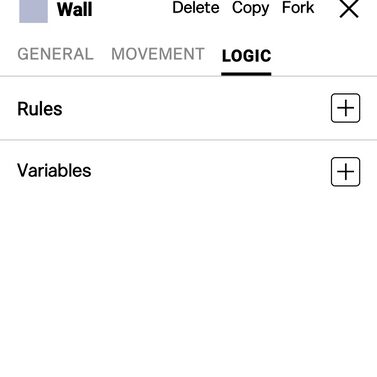Difference between revisions of "Logic"
(added information that prob have bad grammar) |
(various improvements) |
||
| Line 1: | Line 1: | ||
[[File:Logictab.jpg | [[File:Logictab.jpg|open logic tab|thumb|377x377px]]The Logic tab is a tab that is an inspector tab which includes the rules and variables sections of the blueprint. Rules and actor variables play an important role in the functionality of Castle decks. | ||
== | == Rules == | ||
rules | Rules are pieces of logic that have a [[trigger]] and [[Response|responses]]. Using rules, you can control what your actors do under certain conditions, and in response to specific events. | ||
== Variables == | |||
Variables are used to store numbers which can be used later, there are two kinds of variables. | |||
== variables == | === Actor variables === | ||
variables are | Local variables are variables that are accessible by only the actor that owns it and its values cant be edited by other actors | ||
=== | === Global variables === | ||
Global variables are variables that are accessed by all actors in all cards in the deck. They have 2 lifetime types, 'deck play' and 'persistent per player'. | |||
=== | ==== Deck play ==== | ||
Variables that has deck play lifetime has values that only last for a deck play before reseting to its initial value either by the player reseting the deck or the player leaving it | Variables that has deck play lifetime has values that only last for a deck play before reseting to its initial value either by the player reseting the deck or the player leaving it | ||
==== | ==== Persistent per player ==== | ||
Variables with persistent per player lifetime can be used for different stuff like saving progress | Variables with persistent per player lifetime can be used for different stuff like saving progress | ||
basically values will save for each player, for example if player 1 got to level 5 and there is a variable that remembers that, then player 1 will get back to level 5 as soon as they start the deck while player 2 who reached level 11 will have that same variable also remember where they left off, but instead of bringing them back to level 5 they will be in level 11 and it wont affect player 1 which is why its useful for saving progress | basically values will save for each player, for example if player 1 got to level 5 and there is a variable that remembers that, then player 1 will get back to level 5 as soon as they start the deck while player 2 who reached level 11 will have that same variable also remember where they left off, but instead of bringing them back to level 5 they will be in level 11 and it wont affect player 1 which is why its useful for saving progress | ||
Revision as of 19:34, 10 May 2022
The Logic tab is a tab that is an inspector tab which includes the rules and variables sections of the blueprint. Rules and actor variables play an important role in the functionality of Castle decks.
Rules
Rules are pieces of logic that have a trigger and responses. Using rules, you can control what your actors do under certain conditions, and in response to specific events.
Variables
Variables are used to store numbers which can be used later, there are two kinds of variables.
Actor variables
Local variables are variables that are accessible by only the actor that owns it and its values cant be edited by other actors
Global variables
Global variables are variables that are accessed by all actors in all cards in the deck. They have 2 lifetime types, 'deck play' and 'persistent per player'.
Deck play
Variables that has deck play lifetime has values that only last for a deck play before reseting to its initial value either by the player reseting the deck or the player leaving it
Persistent per player
Variables with persistent per player lifetime can be used for different stuff like saving progress
basically values will save for each player, for example if player 1 got to level 5 and there is a variable that remembers that, then player 1 will get back to level 5 as soon as they start the deck while player 2 who reached level 11 will have that same variable also remember where they left off, but instead of bringing them back to level 5 they will be in level 11 and it wont affect player 1 which is why its useful for saving progress
